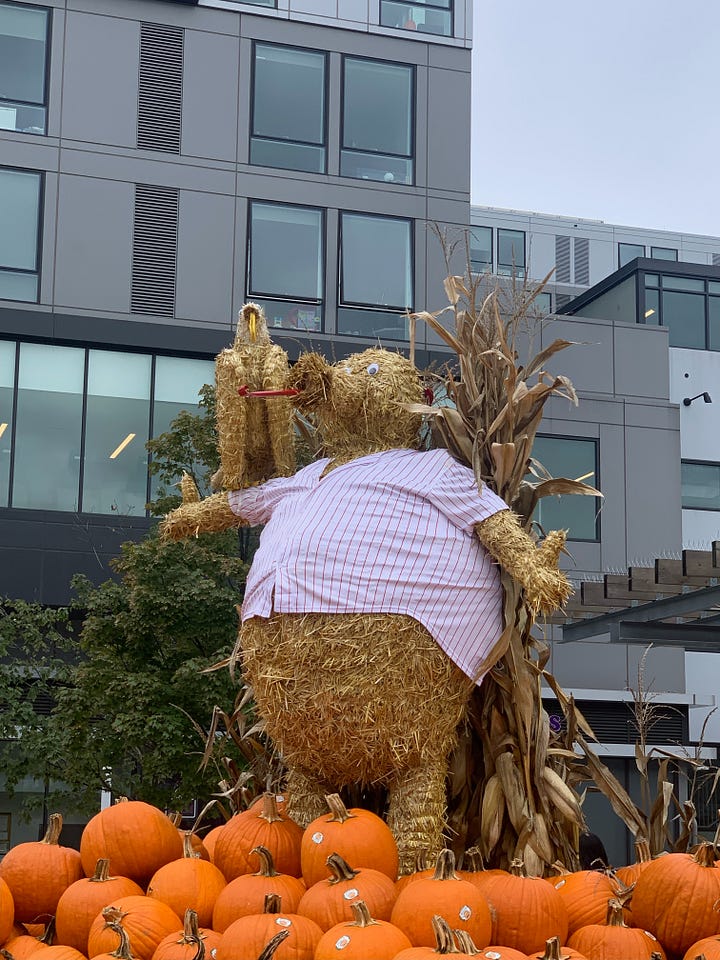AI is a labor rights issue
Creative work and the Luddite urge to firestorm an Azure data center
After five long months, late night is back, baby—I mean, the Hollywood writers strike ended last week. It’s a huge win for workers at the tail end of Hot Labor Summer, and one of the more talked-about parts of the deal is a list of limitations on what studios and production companies can do with AI. If the agreement is ratified, studios won’t be able to replace writers with language models in any significant way. AI can’t be a credited writer, can’t create source material, and writers can’t be required to work with AI tech.
These rules are just one slice of the union’s demands, but they’ve captured a lot of attention. During a shaky time for organic matter’s employment prospects, the horse got weaseled Tom Thumb into a corner.
I really like how author Ted Chiang describes one relationship between AI, labor, and power:
As it is currently deployed, A.I. often amounts to an effort to analyze a task that human beings perform and figure out a way to replace the human being. Coincidentally, this is exactly the type of problem that management wants solved. As a result, A.I. assists capital at the expense of labor.
Now, in a whole range of industries, workers are demanding rules that stop the powerful from wielding AI like a cudgel of economic inequality. Notably, only a small fringe wants to pull the plug on all machine learning; the main contingent simply wants to prevent AI from giving bosses cover to screw over their contractors and employees.


Yes, it was Hot Labor Summer (the coldest labor summer of the rest of our lives?). But now it’s A/W23, and it’s kind of giving Luddite. There’s been a growing reclamation of that Industrial-era social movement: a group of factory workers who, yes, destroyed some knitting machines, but not because they hated knitting machines. It was “collective bargaining by riot”—a years-long protest against bosses reacting to increased productivity by making their workers’ lives measurably worse.
Definitely hoping for fewer public executions this time, but 2023’s worker demands are cut from the Luddite cloth. Artists don’t want AI technology turning into one more lever of power that keeps them fighting for scraps while content monopolies profit.
There’s a lot, a lot of noise in the AI Thunderdome (some nicely outlined here, by Bruce Schneier and Nathan Sanders), but one positive way to throw a wrench in the works is to prevent corporations from copyrighting art made with AI. That would impede the lawyered and the powerful from diluting and demoting human artists’ work by claiming machine-generated portions for themselves—something my colleague Lia Holland calls “human-washing.”
Today we’re running an AI Day of Action, organized by United Musicians and Allied Workers, The Freelancer’s Union, and Lia, Fight’s Campaigns Director-cum-author. We have a very focused goal: a federal law to block large corporations from getting copyrights for works with significant AI-enabled content, thus ensuring at least working conditions for many creative professionals don’t get worse. Learn more about this project and its surrounding universe here.
Is Luddism influencing your A/V setup or your A/W closet? Comment below…
Readout
It’s Banned Books Week. A very direct way to fight the 33% rise in US book bans over the past year is to get involved with your local library. Here’s a checklist to get you started.
We might have been overshadowed by an emotional support alligator, but Fight for the Future got a lot a press protesting facial recognition at a Phillies game this week.







https://en.wikipedia.org/wiki/Coalbrookdale_by_Night